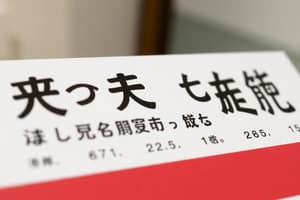Podcast
Questions and Answers
What is the Japanese phrase for 'Good morning'?
What is the Japanese phrase for 'Good morning'?
- Konnichiwa
- Ohayou gozaimasu (correct)
- Konbanwa
- Arigatou gozaimasu
Which Japanese phrase means 'Please'?
Which Japanese phrase means 'Please'?
- Sumimasen
- Atsui desu
- Hai
- Onegaishimasu (correct)
What does the phrase 'Ame ga futteimasu' signify?
What does the phrase 'Ame ga futteimasu' signify?
- I'm sorry
- It's raining (correct)
- Excuse me
- It's hot
Which vowel in Japanese is pronounced as 'ee'?
Which vowel in Japanese is pronounced as 'ee'?
What role does pitch play in Japanese pronunciation?
What role does pitch play in Japanese pronunciation?
Which phrase means 'I'm sorry' in Japanese?
Which phrase means 'I'm sorry' in Japanese?
Flashcards
Japanese 'Good morning'
Japanese 'Good morning'
Ohayou gozaimasu
Japanese 'Please'
Japanese 'Please'
Onegaishimasu
'Ame ga futteimasu'
'Ame ga futteimasu'
It's raining
Japanese vowel 'ee'
Japanese vowel 'ee'
Signup and view all the flashcards
Pitch in Japanese pronunciation
Pitch in Japanese pronunciation
Signup and view all the flashcards
Japanese 'I'm sorry'
Japanese 'I'm sorry'
Signup and view all the flashcards
Japanese 'Good morning' phrase
Japanese 'Good morning' phrase
Signup and view all the flashcards
Japanese 'Please' phrase
Japanese 'Please' phrase
Signup and view all the flashcards
Meaning of 'Ame'
Meaning of 'Ame'
Signup and view all the flashcards
Japanese vowel [i]
Japanese vowel [i]
Signup and view all the flashcards
Study Notes
Dear Friend! I'm excited to share some basics of the Japanese language with you. Let's dive into this fascinating communication system together.
Basic Greetings
In Japan, it is customary to exchange greetings based on time of day and formality. Here are some examples:
- Good morning: おはようございます (Ohayou gozaimasu)
- Good afternoon: こんにちは (Konnichiwa)
- Good evening: こんばんは (Konbanwa)
- Thank you: ありがとうございます (Arigatou gozaimasu)
Common Phrases
Here are some additional phrases that could come handy while interacting with people in Japan:
- How do you do? / Nice to meet you: 今度会えるのありがとうございます (Konde kaeru noborino arigatou gozaimasu)
- Yes: はい (Hai)
- No: いいえ (Iie)
- Please: お願いします (Onegaishimasu)
- Excuse me: すみません (Sumimasen)
- I'm sorry: すみません (Sumimasen)
- It's raining: 雨が降っています (Ame ga futteimasu)
- It's hot: 熱いです (Atsui desu)
Pronunciation
Japanese pronunciation involves understanding five different vowels and various combinations. Remember: [i], [e], [u], [o], [a] = [ee], [eh], [oo], [oh], [ah] respectively. Here are some key points about pronunciation in Japanese:
- Long vowels are pronounced twice as long as short ones.
- There are three kinds of consonants: voiced, semi-voiced, and voiceless.
- Pitch plays an important role in distinguishing words.
- Rising and falling pitch determine meaning in single syllables.
- Practice practicing! Consistent practice will help you master the sounds of the language.
By learning these basic greetings, common phrases, and pronunciation rules, you're well on your way to communicating effectively with native speakers in Japan. Keep up the good work! ありがとうございます (Arigatou gozaimasu)!
Studying That Suits You
Use AI to generate personalized quizzes and flashcards to suit your learning preferences.




